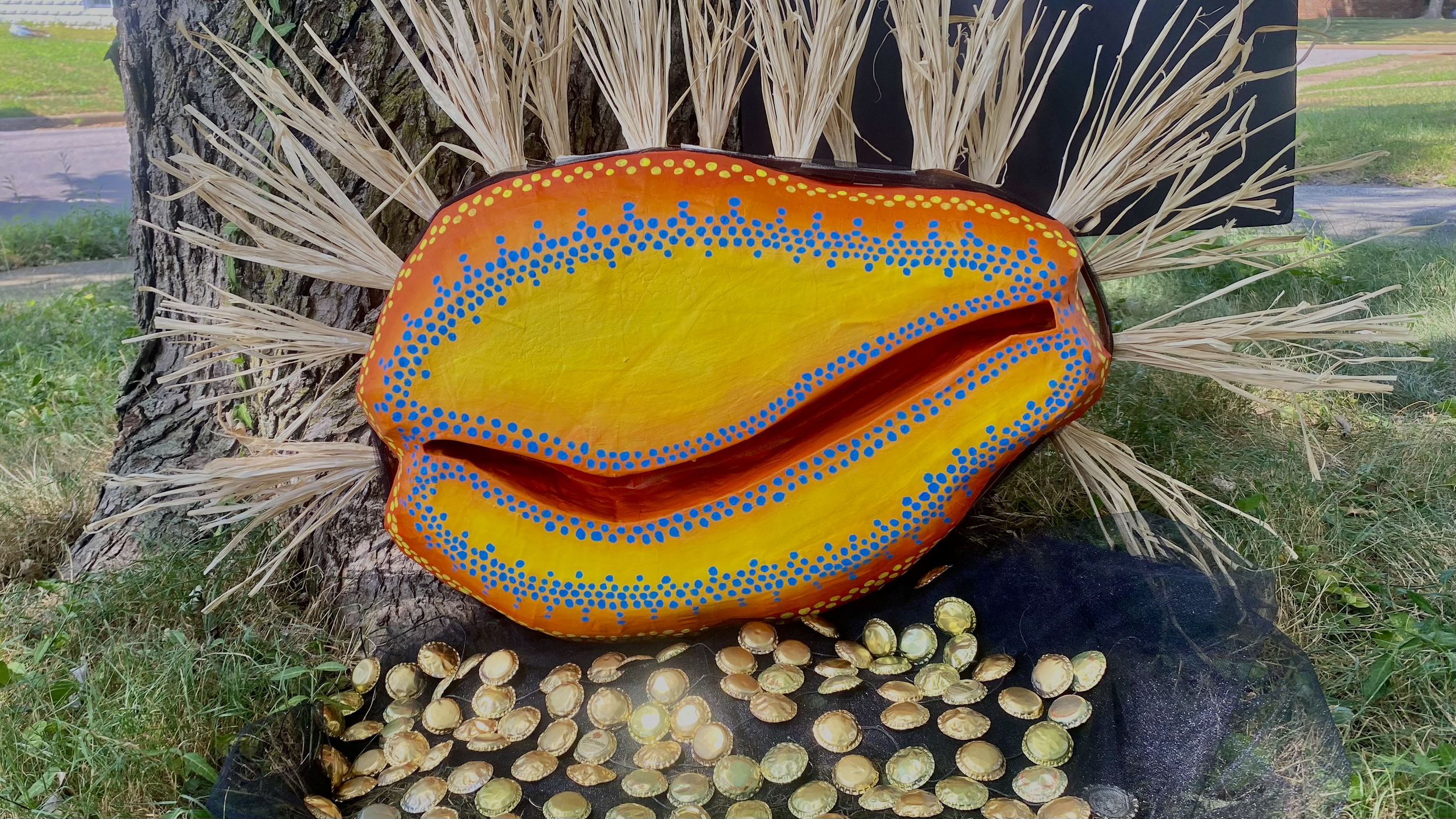
LITHA
LITHA
Elizabeth Dawson
This West African inspired mask and accompanying garment venerates the body of the Cowrie Snail. Through traditions of dance and ritual across Africa, it is common for spiritual beings, deceased family members, and deities to be routinely remembered and honored. The Cowrie Snail’s history exploitation through commodification parallels that of enslaved African people around the continent amidst species endangerment from overharvesting, pollution, and other effects of tourism. This piece acts as a proposal to recognize the Cowrie as an ancestor, healing our related grief through movement and creativity. Using the motifs cultural significance as a symbol of abundance, this piece reminds us to honor our grief within oppressive capitalist systems that feed off of scarcity by remembering what is valuable to us as people. This way, we place our worth and those of living things around us as intrinsic rather than extrinsic, causing us to see ourselves and the world with more care. The future, regardless of the systems that run it, needs more routines that remind communities of their own values and commitments to nature. Dawson believes when these values are the foundations of a community, then the world around us can change for the better.
Elizabeth Dawson
23, Saint Louis, Missouri USA
My name is Elizabeth Dawson, a jeweler and mask maker from the Midwest. My interests in recycled materials, personal ritual, and historical research can be seen in my piece titled Litha. My visual language conveys topics and writings related to ancestral curiosity, decolonialism, old traditions of storytelling, and my own personal journey as a Black Queer person. Ancestry is a topic of passion in my family that I believe influences my work more than I realize. We love doing history on our past together and work hard to remember the names and faces who came before us. Through this love, my art often ties the old and new together and describes time as if it all exists in the present. For this project in the year 2075, I wanted to see the ways the past can inspire and influence the future, and what needs to be changed now. In my work, I am interested in what can change but also what needs to stay the same or be revitalized. For me, mask-making and expressions of the self through what we wear remains a beautiful practice that can mystify crowds but also ground us in who we really are.
Creating masks has become a passion through discovering my interests in costume design, Drag performance, and traditional cultural garments around the world. Litha, specifically, is a project that formed through my personal exploration into African garments and their motifs: the Cowrie snail. My grandmother, a previous African Dance professor, and my grandfather’s Igbo-Nigerian roots inspired me to examine the values and dances of West Africa. My grandmother describes it as healing and freeing to the soul because its movements require the body's full attention. Processing movement of the body as healing, alchemizing, and transformative is a topic I have begun exploring with this project in particular by researching African funerary dances.
The Cowrie is a symbol common to many cultures around the world and is noticed as jewelry or embellishments for larger worn pieces. It’s historical significance as symbols of fertility, abundance, and beauty are popularized while its ties to overfishing, commerce, and the slave trades are less well-known. These snails and their bodies have become overexploited and as more species become endangered due to tourism and overharvesting destroys coral reefs faster than they can grow. The African diaspora’s reflexive relationship to this organism goes back hundreds of years. The way these bodies have been treated throughout the slave trades reflects the devaluing and exploitation of these cultures, lands, and habitats as a whole. This honorary garment for the Cowrie embraces the snail as an ancestor, through shared grief, in an effort to add a different type of value to these species and their habitats. This mask has been an invitation to myself, to derive my value as a person away from materialism and scarcity into something truly abundant and inherent in myself and the world around me.






